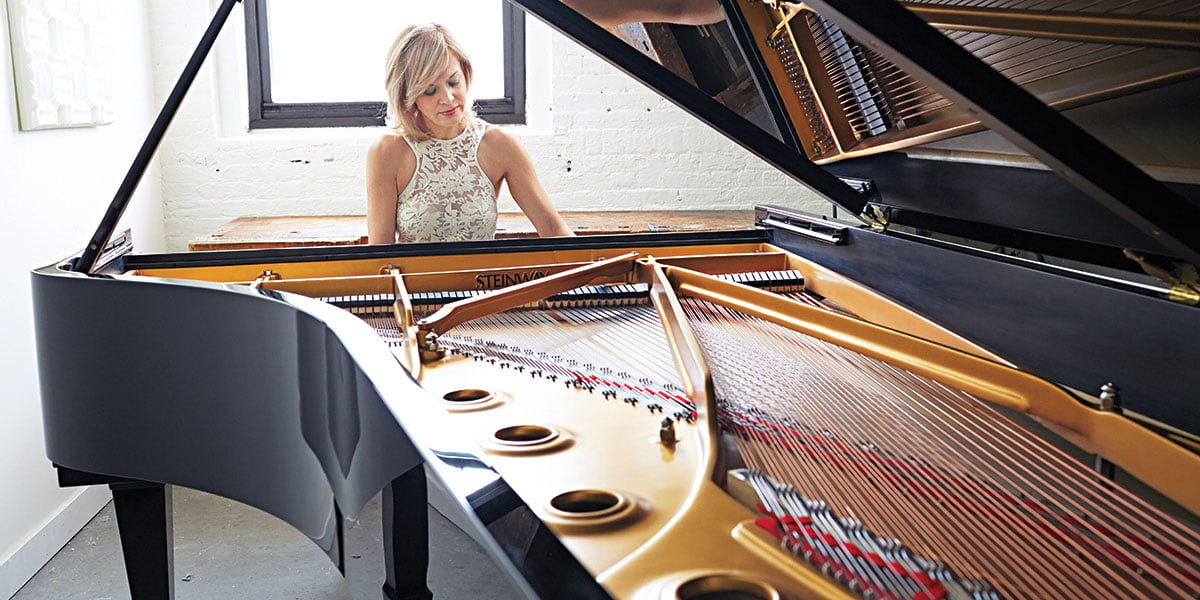3 ways that piano playing aids wellness
December 28, 2021 •Stephen Reed


Over the years, piano teachers, parents, and piano students themselves have sensed a number of emotional and mental health benefits to piano playing. However, in recent years more evidence about specific health benefits from piano playing has emerged, buttressing these subjective beliefs.
The piano has always been seen as a means of creative and emotional expression, along with the joy of performing for audiences large and small. Now, in an age where wellness has become a priority for many more people, the tangible health benefits for piano students make it an increasingly more relevant exercise for young and old alike.
In this article, we will trace these mental, emotional, and physical health benefits. By the end of the article, you will know how piano playing has value-added benefits that can undergird one’s wellness regimen.
1. Strengthening the mind
Perhaps more than any other musical instrument, the piano builds up the player’s cognitive abilities, strengthening the parts of the brain that are used in math and reasoning. According to one study, just three years of piano instruction has a positive impact on a child’s cognitive development.
In addition, regular piano playing provides a workout for a brain’s working memory.

Other good habits like focus, perseverance, and diligence are improved by playing the piano. Research shows that piano playing boosts creativity, too. Even accepting constructive criticism from one’s piano teacher can help a young person to become a more secure individual.
Additionally, split concentration, also called divided attention, is an integral part of playing the piano, which helps a pianist’s concentration skills. A piano student uses both hands, reads music, listens to the notes being played, and presses the pedals. That’s real multi-tasking, especially for young piano students.
One study conducted indicates that children who play an instrument for 20-30 minutes each day benefit from their multitasking skills in education and personal lives.
2. Calming the mind
Music-making also has a calming effect on the mind. Research shows that time spent at the keyboard improves mental health: piano players frequently experience less loneliness, anxiety, and depression than their non-musical peers.

A 2013 study published by the National Library of Medicine discovered that playing piano treats depression and alleviates stress.
Expressing one’s emotions through a powerful instrument can offer a young person a much-needed release from the stresses of school, difficult peer relationships, and other growing pains.
The sense of accomplishment that attends a young person playing a challenging piano piece is obviously one source of a healthy self-esteem. Parents have long grasped this, instinctively giving praise and encouragement to their piano playing children, serving as their first “audience.”
3. Improving one’s physical health

You might not believe it at first, but sitting down to play the piano is actually quite a workout. Fine motor skills and hand-eye coordination are sharpened. Playing the piano also makes your hands and arm muscles much stronger than the average person.
Recent research suggests that older piano players can benefit from increased levels of Human Growth Hormone, which can slow some of the effects of aging.
Another study asserts that having music in one’s life on a regular basis has also been proven to reduce anxiety, relieve stress, and even manage pain.
Playing the piano can improve your overall aural awareness, as well. Playing the piano trains students to recognize tones, intervals, and chords as well as helping them to develop a sense of pitch.
Playing the piano requires “an open and occupied mind”
Patrick Elisha of the M. Steinert Education Department has played the piano and other instruments for many years. Recently he reflected on the wellness benefits he has experienced in playing the piano.
“Piano playing is an exercise demanding an open and occupied mind alike,” notes Patrick. “The very entropy that we seek to escape from in our lives is replaced with this incredibly complex choreography of the body, mind, and soul, a purifying and singularly-focused process.”

Patrick goes on to say that the health and well-being of any human being require both stability and the mercurial nature of the unknown, the latter of which helps one to be imaginative while heavily relying on the stable training needed to effectively express music through the piano.
In short, like a good piano itself, piano practicing develops the stability and knowledge to allow one to be both grounded yet creative. One has to know the fundamentals of piano playing before one can improvise well.
“This ballet of sorts stops time, if one is willing,” says Patrick. “With the right investment in time itself as well as the instrument being used for the journey, it can inspire and awaken the creative and curious elements inside us, all through the universal language of music-making.”
Different wellness benefits for different people
Different people get different wellness aspects out of their piano playing. Some may need a creative or emotional release, a deep break from the stresses of work and life in general. Others may want to develop multitasking skills and better concentration.
Whichever of these wellness areas you wish to work on, the piano gives you the opportunity to improve yourself while enjoying the challenge and fun of making music.
Come into our showroom in Newton and start trying some of the pianos for yourself. One of our seasoned piano consultants will be glad to learn about your needs and interests to help you find the right piano for you.
Until then, enjoy a few more columns to learn about some of Steinway’s most inspiring piano models and the kind of piano that is best for young piano students:
Featured Articles
Categories
- Beginner Pianos (24)
- Boston Pianos (16)
- Comparisons (30)
- Designer and Specialty Pianos (8)
- Essex Pianos (10)
- Events (11)
- Featured (24)
- Institutional (3)
- Joy of Piano (15)
- Learning About Pianos (72)
- News (35)
- Pricing and Cost (19)
- Resource Center (125)
- Roland Pianos (6)
- Spirio (15)
- Steinway Pianos (71)
- Student (14)
- Teacher (13)
- Used Pianos (21)
- Videos (19)

